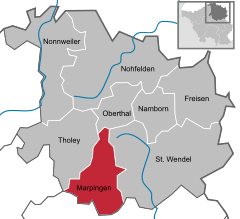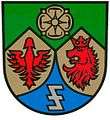Marpingen
| Marpingen | ||
|---|---|---|
| ||
 Marpingen | ||
Location of Marpingen within Sankt Wendel district 
 | ||
| Coordinates: 49°27′N 7°3′E / 49.450°N 7.050°ECoordinates: 49°27′N 7°3′E / 49.450°N 7.050°E | ||
| Country | Germany | |
| State | Saarland | |
| District | Sankt Wendel | |
| Government | ||
| • Mayor | Volker Weber (SPD) | |
| Area | ||
| • Total | 39.68 km2 (15.32 sq mi) | |
| Population (2015-12-31)[1] | ||
| • Total | 10,337 | |
| • Density | 260/km2 (670/sq mi) | |
| Time zone | CET/CEST (UTC+1/+2) | |
| Postal codes | 66646 | |
| Dialling codes | 06827, 06853 | |
| Vehicle registration | WND | |
| Website | www.marpingen.de | |
Marpingen is a municipality in the district of Sankt Wendel, in Saarland, Germany. It is situated approximately 8 km west of Sankt Wendel, and 25 km north of Saarbrücken.
The municipality contains the urban areas Marpingen, Urexweiler, Alsweiler und Berschweiler, which have the status of Ortschaft, and Rheinstraße, which is in the administrative area of Marpingen, und Habenichts, which is in the administrative area of Urexweiler.
History
In 1876, at the height of the Kulturkampf, Marpingen was claimed to be the site of an apparition of the Virgin Mary, leading to a major conflict between the Prussian Government and the believers who flocked to Marpingen as a result.
References
- ↑ "Fläche und Bevölkerung - Stand: 31.12.2015 (Basis Zensus 2011)" (PDF). Statistisches Amt des Saarlandes (in German). July 2016.
- Blackbourn, David (1994). Marpingen: Apparitions of the Virgin Mary in Nineteenth-Century Germany. New York: Alfred A Knopf. ISBN 0-679-41843-1. See David Blackbourn
External links
See also
This article is issued from Wikipedia - version of the 9/1/2016. The text is available under the Creative Commons Attribution/Share Alike but additional terms may apply for the media files.
